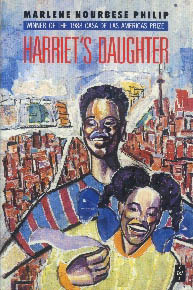Zetta Elliott's Blog, page 93
March 5, 2011
can you hear me?
It's hard to write when you're unsure of your audience. Who needs to know about the representation of blacks in Canadian children's literature? If I write a traditional scholarly paper and submit it to an academic journal, it'll be read by a handful of people. If I post an informal essay on my blog, then anyone who searches for Canadian children's literature will be able to find this data. But how do I reach the powers that be and/or the general public in Canada?
My examination of middle grade and young adult novels published in Canada since 2000 reveals a curious preoccupation with slavery. Of the 25 novels I was able to find, 8 are written by black authors and 17 by white authors; 3 of the 8 black-authored novels are on the subject of slavery; 2 are set in contemporary Africa, and 3 are set in the contemporary Caribbean. Only 1 is set in contemporary Canada, and judging from the cover, it is unclear whether this black-authored book features a black protagonist (I Have Been in Danger by Cheryl Foggo; 2001).
Of the 17 novels written by whites, 10 are historical novels set in the era of slavery; 6 are set in Africa (5 contemporary, 1 historical), and one contemporary novel (Jakeman by Deborah Ellis; 2007) is set in the United States.
What does this tell us about the way black children figure in the (white) Canadian imagination? In these 17 novels, black youth appear as fugitive and/or former slaves or as African refugees fleeing from war and disease. Why is it so difficult for authors of any race to situate black teens in contemporary Canada? Are such manuscripts being rejected by Canadian publishers in favor of stories set in more "exotic" locales, or do they not even exist? What could explain this silence from writers in the black Canadian community? In the US, women writers are responsible for the majority of black-authored MG/YA novels. It's hard for me to name any contemporary black female authors in Canada—there's no Canadian equivalent of Edwidge Danticat or Chimamanda Ngozi Adichie or Zadie Smith (novelists under 40). So perhaps the lack of MG/YA novels has something to do with the larger absence of black women from the Canadian literary scene…








it's all coming back to me…
I can't quite remember the last time I sat down and wrote a traditional conference paper (Powerpoint has totally changed the way I present). I took on too many conferences this semester, and now I have to retrench; when you're paying your own way and teaching two courses, you have to be realistic about what you can do—and do well. The paper I'm writing now is a little old; I first proposed it for a 2009 conference in Frankfurt, and it was accepted but I couldn't afford to go. Then I turned it into a blog post, and now I'm reworking it for a panel on African Canadian literature. And we all know what happens when I write about Canada…
But so far, the irrational rage is taking a back seat to actual statistics:
according to DiverseCity: The Greater Toronto Leadership Project, "only 4.8 per cent of editors, senior management and board members are visible minorities." ( Globe & Mail )
If that's the state of affairs in the publishing industry (which is based in Toronto), then it's no big surprise that only ONE black-authored young adult novel was published in Canada in 2010. And why is that one novel set in Ghana and not in Canada? Perhaps because representing black people living IN Canada (not as fugitive slaves) would suggest that there ARE black people who belong in Canada:
"In popular parlance 'culture' in multiculturalism is code for 'non-western' and non-white, much in the same way that ethnicity or 'ethnics' typically refer to non-whites. The erroneous assumption is that new immigrants in Canada (mostly non-white) have culture or 'ethnicity' in contrast to the 'mainstream' or 'normal Canadians'. In this social construction, those belonging to non-western cultures are socially produced as not fully belonging to the nation, as not fully Canadian." (Tania Das Gupta, FEDCAN blog )
So in a way, to celebrate multiculturalism within children's publishing is to focus on people who are NOT Canadian, not fully here, not contributing members of the "mosaic nation." Even though (or perhaps because) the country's cities are rapidly changing:
"When Canada marks the 150th anniversary of Confederation in 2017, one in five Canadians will be a racialised minority. And projections show that by 2031, racialised minorities will make up 63 percent of Toronto's, 54 percent of Vancouver's and 31 percent of Montreal's population." (Malinda S. Smith, FEDCAN blog )
I'm not fully convinced that traditional scholarship can correct the problems I see in Canadian children's publishing, but it's good to lay things out and make it plain. I've got my notes, I've re-read the two novels I'm critiquing, I've got statistics and tables. Now I just have to sit down and write the darn thing…








March 3, 2011
two great giveaways
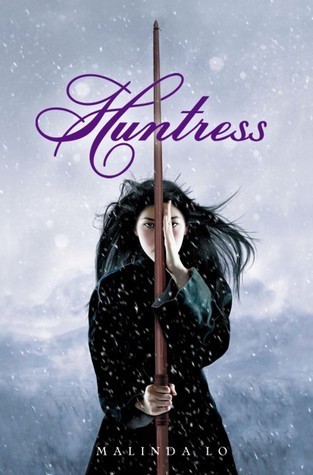 The Book Smugglers are holding a giveaway—enter now to win a copy of Shine, Coconut Moon and Jazz in Love by Neesha Meminger. Then head over to Cindy Pon's blog to win a copy of Akata Witch and Who Fears Death by Nnedi Okorafor, as well as Huntress and Ash by Malinda Lo. I'm reading Who Fears Death now and it's fantastic…
The Book Smugglers are holding a giveaway—enter now to win a copy of Shine, Coconut Moon and Jazz in Love by Neesha Meminger. Then head over to Cindy Pon's blog to win a copy of Akata Witch and Who Fears Death by Nnedi Okorafor, as well as Huntress and Ash by Malinda Lo. I'm reading Who Fears Death now and it's fantastic…








March 1, 2011
sunny day
 Nothing makes up for a sleepless night like a sunny morning and a wonderful review! Colleen over at Lavender Lines is only the second Canadian book blogger to review Wish (thank you, Colleen!). Here's some of what she had to say:
Nothing makes up for a sleepless night like a sunny morning and a wonderful review! Colleen over at Lavender Lines is only the second Canadian book blogger to review Wish (thank you, Colleen!). Here's some of what she had to say:
I have a confession to make: while I read A LOT, I don't tend to read books with main characters from different cultures and backgrounds than my own. It's something that I want to work on, to change. A Wish After Midnight is my first attempt at broadening my literary horizons. And if every subsequent book is as tightly written and captivating as this one I should be a more well rounded reader in no time.
Maybe Doret's right—maybe more and more book bloggers are throwing their support behind writers of color! It's definitely appreciated. In other Canadian news, I'll be at the Toronto Women's Bookstore next month along with Vivek Shraya and Neesha Meminger. I'll post more details about the April 21st event ("Changing the Face of Publishing") as it draws near—you'll be able to watch it on the store's website if you're not up in the Great White North…








February 28, 2011
magic trumps misery
February 27, 2011
add your name
New York Amsterdam News
A resolution to the situation at
Medgar Evers College
Amiri Baraka, Sonia Sanchez, Kevin Powell, Danny Simmons, Cornel West and others respond
Published: Thursday, February 24, 2011 12:05 AM EST
Dear Editor,
As writers and educators who have participated in literary programs at Medgar Evers College, we have viewed from afar its situation with deep concern. Medgar Evers College has long been known for its tradition and legacy of providing an educational and cultural haven for the preservation, study and celebration of the heritage, arts and traditions of Black people throughout our country and the world. Those who find it necessary to advocate on behalf of preserving this legacy and mission have the right to do so. The practice of active engagement in a cause based on one's principles is to be celebrated, not denigrated. This practice of activism forms the bedrock of our institutions of higher education.
Professor Ragland's insinuation in the Amsterdam News that this struggle to maintain the mission and integrity of Medgar Evers College is all about Dr. Greene's teaching schedule is bizarre to say the least. Dr. Greene's work as the founder of the Center for Black Literature, as the director of the National Black Writers Conference and as an educator who has demonstrated her professional commitment to Medgar Evers College and the community throughout her career is well documented. The critical issues of leadership that have been cited by many involved in the struggle to preserve Medgar Evers College's mission are broad and demand attention
There must be a resolution to this situation. Medgar Wiley Evers died advocating for the civil rights of Black citizens throughout this country. The mission of a college named in honor of his legacy and founded on the principles of activism and engagement must be preserved. We commend the broad constituency of educators, students, clergy, elected officials and community citizens from across the city of New York for their courage, conviction, commitment, tenacity and willingness to advocate for a resolution to the events and actions that have negatively impacted a college built on a foundation and tradition grounded in the struggle for social justice. This is democracy in action and should be respected.
Amiri Baraka, writer, activist, professor emeritus, SUNY Stonybrook; Edwidge Danticat, writer; Marita Golden, writer; Haki Madhubuti, poet, the Ida B. Wells-Barnett professor at DePaul University and founder and publisher of Third World Press; Kevin Powell, activist, writer; Ishmael Reed, writer, professor emeritus, University of California, Berkeley; Quincy Troupe, poet, writer, editor, Black Renaissance Noir; Sonia Sanchez, poet, writer, activist, professor emeritus, Temple University; Danny Simmons, artist, writer, chairman RUSH Philanthropic Foundation, NYSCA chairman, Crown Heights resident; Cornel West, professor, Princeton University; and John Edgar Wideman, writer, ASA Messer professor, Africana studies and literary arts, Brown University
If you haven't already signed the petition, you can do so here.








February 25, 2011
adrift
 Now that I've finished Ship of Souls, I find myself drifting along…searching for something to fill the hole left by a finish manuscript. I've got plenty of grading to do, and reading for class; I just finished a last-minute application for an NEH Summer Institute on slavery and rebellion in the tropics…there's still time, if you're interested (deadline is March 1). But what I really want is to be back with my characters in their underground world…the ending is open, but I'm not ready to start the sequel now—I haven't even finished the sequel to Wish! I guess I'll do some grading, work on my conference paper, and try to dream up another book…rainy days are made for dreaming.
Now that I've finished Ship of Souls, I find myself drifting along…searching for something to fill the hole left by a finish manuscript. I've got plenty of grading to do, and reading for class; I just finished a last-minute application for an NEH Summer Institute on slavery and rebellion in the tropics…there's still time, if you're interested (deadline is March 1). But what I really want is to be back with my characters in their underground world…the ending is open, but I'm not ready to start the sequel now—I haven't even finished the sequel to Wish! I guess I'll do some grading, work on my conference paper, and try to dream up another book…rainy days are made for dreaming.








February 23, 2011
Laura Atkins, children's literature specialist
This is my second interview with children's literature specialist (and my good friend) Laura Atkins. If you missed my first interview with her, be sure to check it out—and stop by Laura's new blog. Most importantly, read her essay on white privilege in the children's publishing industry. And now, without further ado…
1. Many times I've told friends that I wish I could somehow "clone" you! I think you're an exceptional editor–can you tell us how you entered the publishing world and how your role has changed over time?
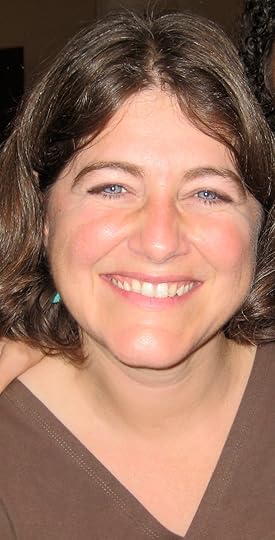 Thanks very much for your kind words (though a cloned me also sounds a bit creepy!).
Thanks very much for your kind words (though a cloned me also sounds a bit creepy!).
I got into publishing soon after graduating from college in 1992. I was in the Bay Area and found out about Children's Book Press, a non-profit publisher of multicultural picture books. I was drawn to their political aims (inclusion and producing bilingual books) as well as the idea of working in children's publishing. I initially contacted them about becoming an intern, but they weren't looking at the time. A year later they got in touch with me when they were looking for an editorial assistant.
 I started doing a whole lot of things – mainly going through the slush pile and supporting the then-publisher, Harriet Rohmer. It was great working at a small press, as I eventually got involved in working with designers on art direction, overseeing production (getting books printed), and had more of a role in the editorial process. I was at Children's Book Press for four years, and worked on amazing books such as In My Family by Carmen Lomas Garza, Home to Medicine Mountain by Chiori Santiago and Judith Lowry, and i see the rhythm by Toyomi Igus and Michelle Wood (which won the Coretta Scott King Award).
I started doing a whole lot of things – mainly going through the slush pile and supporting the then-publisher, Harriet Rohmer. It was great working at a small press, as I eventually got involved in working with designers on art direction, overseeing production (getting books printed), and had more of a role in the editorial process. I was at Children's Book Press for four years, and worked on amazing books such as In My Family by Carmen Lomas Garza, Home to Medicine Mountain by Chiori Santiago and Judith Lowry, and i see the rhythm by Toyomi Igus and Michelle Wood (which won the Coretta Scott King Award).
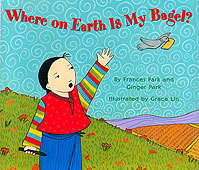 After that I moved to New York City where I worked as an Assistant Editor at Orchard Books for a year (working primarily on imports), and then as an Editor at Lee & Low Books for two years. At Lee & Low I managed the New Voices Award in its first year, which as you know is an award for an author of color who has not previously published a picture book. We had over 300 submissions, which to me showed the large number of authors of color out there who are trying to get published. My first book at Lee & Low was DeShawn Days by Tony Medina and Greg Christie. I really enjoyed the editorial process on all of the books I worked on. The best authors were those who enthusiastically engaged in the editorial back and forth. Ginger and Frances Park were a great example. They are sisters who run a chocolate shop in DC, but they also write books together. They wrote Where on Earth Is My Bagel?, illustrated by Grace Lin.
After that I moved to New York City where I worked as an Assistant Editor at Orchard Books for a year (working primarily on imports), and then as an Editor at Lee & Low Books for two years. At Lee & Low I managed the New Voices Award in its first year, which as you know is an award for an author of color who has not previously published a picture book. We had over 300 submissions, which to me showed the large number of authors of color out there who are trying to get published. My first book at Lee & Low was DeShawn Days by Tony Medina and Greg Christie. I really enjoyed the editorial process on all of the books I worked on. The best authors were those who enthusiastically engaged in the editorial back and forth. Ginger and Frances Park were a great example. They are sisters who run a chocolate shop in DC, but they also write books together. They wrote Where on Earth Is My Bagel?, illustrated by Grace Lin.
I eventually left publishing to come to England and study for a Masters in Children's Literature at Roehampton University, where I am now a part-time lecturer. While I loved helping to publish children's books, I got tired of the politics of the industry. Now I can work with aspiring authors, and even continue to edit children's books, but as a freelancer. I have been editing children's books for Cassava Republic Press based in Nigeria, which has been fascinating. Their aim is to publish books by African authors, and I have had to be particularly aware of how my background and experience influence my response to manuscripts. I also offer manuscript critiquing to aspiring authors, and mentor a few individuals on an on-going basis. And I run a monthly writing group. I am enjoying the opportunity to continue to work with authors and illustrators, but without the restrictions of being based at one publishing house.
2. Jacqueline Woodson (in an interview with Rhapsody in Books) recently talked about aspiring authors who submit unpolished manuscripts. How important is the revision process, and does "polishing" diminish a manuscript's originality? I think of editors who want "universal" stories and so dismiss or distort ethnically-specific narratives.
This is an interesting question. I think the revision process is crucial, and it does not necessarily require losing ethnic and cultural specificity or nuance. Part of this depends on whether you are just trying to write the best book you can, or if your main goal is to get published by a mainstream publisher.
We both know there are problems within the publishing industry, and a tendency to privilege more comfortable and so-called "universal" stories. But there are talented diverse authors being published on both sides of the pond. I would always encourage aspiring authors to revise their stories, but they should do this based on their own aims and goals. I see my job as helping people to tell the best story they want to tell, not to change it to something more universal or commercial (unless they ask me to). Perhaps the best advice would be to revise, to make the story work as well as you can, and then to try to find agents or publishers who seem open to the type of story you are trying to tell – in terms of voice, style, narrative form, etc. But I'm not going to lie. Getting published is enormously difficult, and even more so these days if you aren't submitting a book that is perceived as having large commercial appeal. Which leads to your next question about self-publishing…
3. Your clients have achieved great success so far! Why do you think this is? And what is your vision in terms of the future of publishing? I've shied away from self-publishing picture books–is that a viable option for aspiring writers?
I have been so impressed with my clients' recent achievements (though feel strange about the term client, as many have become more like friends). Two people I've worked with have been long- and shortlisted for the prestigious Chicken House Award, another shortlisted for the Brit Writers Award last year, another recently signed up with an agent, and another has had her work requested by OUP. This is because they are talented writers, and because they have put an enormous amount of work into developing their craft. They have also done their research and gotten their work out there – joining SCBWI, attending conferences, submitting for competitions (you've got to be in it to win it), submitting to agents, revising their work again and again. All but one of these people is part of my monthly writing group, so they are critiquing other people's stories as well as their own. This process is invaluable, and I would highly recommend joining a group to aspiring authors.
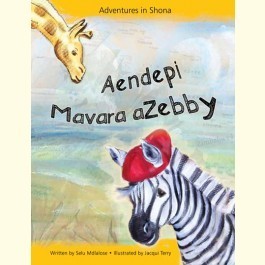 The future of publishing? Publishers are having to do lots of catch up on the digital front, figuring out how to get work off the printed page and use the array of new digital platforms. I think there's going to be much more room out there for people to self publish, though they will need to do a lot to be heard among the scads of other people doing the same thing. I've worked with a few people who have self published picture books. One is Navjot Kaur who set up her own publishing house in Canada, Saffron Press. She is interested in representing Sikh culture in children's books, and has done a lot of work with educators in particular to spread the word. Selu Mdlalose set up Vezani Publishing to produce books in South African languages in the UK. They have printed a high-quality board book about a zebra who loses in stripes.
The future of publishing? Publishers are having to do lots of catch up on the digital front, figuring out how to get work off the printed page and use the array of new digital platforms. I think there's going to be much more room out there for people to self publish, though they will need to do a lot to be heard among the scads of other people doing the same thing. I've worked with a few people who have self published picture books. One is Navjot Kaur who set up her own publishing house in Canada, Saffron Press. She is interested in representing Sikh culture in children's books, and has done a lot of work with educators in particular to spread the word. Selu Mdlalose set up Vezani Publishing to produce books in South African languages in the UK. They have printed a high-quality board book about a zebra who loses in stripes.
Self publishing picture books used to be cost prohibitive, but I think prices have become more reasonable and people more ambitious. But you have to be fearless. You will need to do an enormous work to promote your books. Publishing in a niche is helpful here, so you can target particular people who will be interested in what you are selling.








February 22, 2011
round UP
Thanks to Nathalie at Multiculturalism Rocks! for posting this great review of Wish; this was my favorite part:
If I were to walk by a fountain after midnight and to throw a penny in it, here's the wish I'd make: For A WISH AFTER MIDNIGHT to be adapted on the big screen. I can't wait for it!
While you're there, make sure you read Nathalie's interview with Writers Against Racism founder Amy Bodden Bowllan.
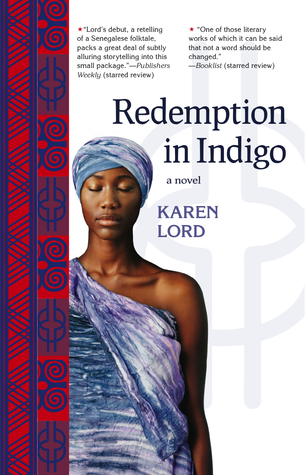 Next stop: Shveta's "3 Days of Fey" feature at her LiveJournal blog. There's a fabulous interview with Karen Lord (author of Redemption in Indigo) and links to Con or Bust, the important fundraising initiative that helps to send PoC writers to speculative fiction conferences.
Next stop: Shveta's "3 Days of Fey" feature at her LiveJournal blog. There's a fabulous interview with Karen Lord (author of Redemption in Indigo) and links to Con or Bust, the important fundraising initiative that helps to send PoC writers to speculative fiction conferences.
Last but not least, check out Dia Reeves' guest post on black speculative fiction authors at Diversity in YA Fiction:
The reason I think there are so few of us is because, for black authors, if you want to be taken seriously, you gotta write issue novels. If you write a story about slavery or civil rights or being oppressed in the ghetto or (if you're really daring) being oppressed in the suburbs, then people will love you and give you prestigious awards and breakdance when you walk down the street.
But if you're crazy like me and write about girls who don't feel that being black is particularly difficult, who don't at some point compare themselves to a white person and feel like they got the short end of the stick, who are in fact quite comfy their own skins and just want to kill monsters or bad guys and then find the nearest, hottest boy and make out with him, well … let's just say that people won't love you. They certainly won't give you prizes or do breakdances in your honor.








February 21, 2011
persist
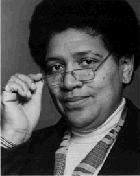 I've been quiet lately. I'm writing the last chapter of Ship of Souls, and haven't been able to sleep through the night due to this chronic condition. I'm weary and find it so disheartening that elected officials are taking aim at my life—Planned Parenthood, teachers, unions, NPR, PBS. I don't understand how ordinary working people can vote for politicians whose sole aim is to render the people powerless. Folks overseas are in the street, fighting for democracy; we've got a democracy, and yet the rich are still calling the shots—their interests come before anyone else's. How is this possible? Many thanks to Sarah Schulman who posted this quote from the brilliant author/activist Audre Lorde:
I've been quiet lately. I'm writing the last chapter of Ship of Souls, and haven't been able to sleep through the night due to this chronic condition. I'm weary and find it so disheartening that elected officials are taking aim at my life—Planned Parenthood, teachers, unions, NPR, PBS. I don't understand how ordinary working people can vote for politicians whose sole aim is to render the people powerless. Folks overseas are in the street, fighting for democracy; we've got a democracy, and yet the rich are still calling the shots—their interests come before anyone else's. How is this possible? Many thanks to Sarah Schulman who posted this quote from the brilliant author/activist Audre Lorde:
"That you can't change City Hall is a rumor being spread by City Hall."
Don't believe the hype. Find a way to fight back. Write the stories that will set the record straight.










